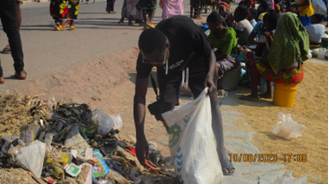An initiative in Mpulungu tackles the widespread plastic waste pollution by collecting plastic from public spaces and using a unique process involving melting plastic with kerosene and red oxide color to create floor polish wax and plastic tiles, mitigating pollution and providing economic opportunities. This effort also involves community sensitization, local partnerships, and sustainability measures to combat plastic pollution and its environmental impact, complementing government-led initiatives against deforestation and improper waste disposal.
Youth-Led Mpulungu Plastic Revolution

Building up the Strongest Foundation for the Young
The intervention addresses the rampant plastic waste pollution in Mpulungu by collecting plastic waste from public areas and repurposing it through a unique process of recycling. The collected plastic is melted with kerosene and red oxide color, then transformed into floor polish wax and plastic tiles. The approach not only reduces plastic pollution but also offers economic benefits to the community. Sensitization efforts and collaboration with local entities enhance the project's impact, while monitoring and sustainability considerations ensure its long-term success and growth.
Mpulungu is grappling with climate change issues, including deforestation for charcoal and firewood, as well as improper plastic waste disposal. This has led to soil degradation and reduced agricultural yields, while plastic waste near Lake Tanganyika is causing water pollution and harming the ecosystem. To address these challenges, the government is partnering with relevant ministries to raise awareness about plastic pollution and its impact. They are also working on cleaning drainage systems and markets in the district as part of their efforts.
The plastic recycling initiative showcases a collaborative effort of state and non-state actors within the community. The initiative is tailored to the local context, emphasizes education and awareness to combat plastic pollution using three R’s of reduce, reuse and recycle. Its approach addresses improper waste disposal in the environment, especially drainage systems and markets, with a focus on the ecological and economic consequences. The melting process of plastics in the smelters does not allow gas emissions as the lid to the smelter chamber is tightly sealed. The solution is aimed at reducing plastic waste pollution which inevitably contributes to climate change by applying efficient and effective climate smart initiatives that reduce the impacts such as recycling. The involvement of government ministries reflects a commitment to sustainable, long-term change.
Engaging the community and integrating livelihood concerns further enhance its impact. This initiative's potential for replication highlights its model nature, making strides toward a cleaner, more environmentally conscious community. The intervention is being led a youth club of young people from Mpulungu district. The target market is all households in Mpulungu using cemented floors. The initiative uses a local business model of targeting local market such as households, markets and local stores. The competitors are retail shops selling floor polish with a model of cheap, affordable and durable principles.
An increased number of young people involved in the climate change fight by getting involved in collecting plastic waste for beneficial use. An increased number of young people knowing about climate change, 1000 women reached through door-to-door sensitization, 1500 youths reached through focus group meetings and about 120,000 reached through Radio Programs.
- The intervention is currently dependent on research for improved technologies but is limited due to financial capacity difficulties. Majority of the people in Mpulungu use floor wax polish and prefer plastic tiles that are locally made therefore increasing sales and creating employment for the locals.
- The solution follows the rules and regulations of the Zambia Environmental Management Act of the laws of Zambia. The club has extensive experience in plastic waste collection, sorting (separation), recycling, and community outreach programmes.
Scaling deep: The scalability lies in replicating this community-led approach in other regions, fostering awareness, collaboration, and sustainable practices to combat plastic pollution and promote a circular economy. The organization is youth led and therefore has got enough room for capacity building for efficiency. This can also include exchange visits for the exchange of brilliant ideas for similar actions or interventions.
Scaling up: The solution wishes to engage stakeholders in influencing and analyzing policies that promote climate smart interventions. It is imperative to enact policies that incentivize and mandate climate smart interventions, including plastic waste recycling, within broader environmental and sustainability frameworks.
Scaling out: To replicate the intervention in diverse contexts, establish a knowledge-sharing platform that provides step-by-step guidance, technical support, and best practices to interested communities. Secure funding and partnerships to improve access to recycling infrastructure, such as smelters and recycling centers, and ensure the availability of essential resources like raw materials, training, and equipment, fostering successful implementation of similar initiatives beyond the original location.
- There is a huge demand for homemade floor polish and plastic floor tiles.
- Recycling initiatives can create local employment opportunities, from collection and sorting to processing and distribution of recycled materials.
- Engaging with the community to raise awareness about the importance of recycling, proper waste separation, and the environmental impact of waste can lead to increased participation and improved recycling rates.
- Collaboration between local governments, businesses, and nonprofit organizations can lead to effective recycling programs that leverage expertise and resources from various sectors.
- Communities can establish circular economy models by promoting the use of recycled materials in local manufacturing processes, reducing the need for virgin resources.
- Engaging schools and educational institutions in recycling initiatives can instill eco-consciousness in young generations and promote lifelong sustainable habits.

